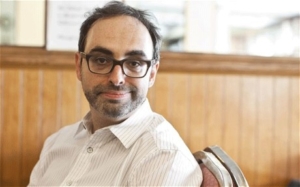In 1939, The Partisan Review sent out a questionnaire to a number of prominent writers, asking them about literature, politics and their identities. While the questionnaire hasn’t been completely forgotten, we felt that these specifically political questions were rarely being asked of our writers. Considering that 2011 was a year of global unrest, we felt that it would be particularly relevant to update The Partisan Review’s questions. (For the curious, here are the original questions.)
Gary Shteyngart is the author of three novels, the most recent of which is Super Sad True Love Story. You can read another interview with Shteyngart, which was published earlier this year, here.
2011 was the year of the Arab Spring. There have also been massive protests in Greece, Spain, Britain, and most recently, the United States. Does literature have a responsibility to respond to popular upheaval?
Well, I’m the kind of writer who is interested in the whole world around him, and I mean the whole world from the Arctic Circle to Capetown, not just a few zip codes in Western Brooklyn. Having said that, I don’t think a writer has the responsibility to do anything, other than write and write and write until they come to cart us away to the loony bin or the grave.
Do you think of yourself as writing for a definite audience? If so, how would you describe this audience? Would you say that the audience for serious American writing has grown or contracted in the last ten years?
I think the audiences for serious literature have been contracting for a while. I get a nice balance of age and gender at my readings, but I do fear that eventually the audience of readers and writers will be one — essentially, we’ll just be writing for our writer friends. Which sounds cute, although I’m not sure how it will pay for my dental cleanings.
Do you place much value on the criticism your work has received? For the past decade we’ve seen a series of cuts to predominant literary magazines and literary supplements, and in response, criticism has moved online. Do you think this move to the non-professional realm has made literary criticism more or less of an isolated cult?
Positive criticism is good, but negative criticism is okay too. When there’s no criticism, that’s when the problems begin. The destruction of the literary supplements and other outlets has an adverse effect on how much time I have to promote the book, make crazy trailers, etc. In essence it takes three times longer to get the same results as one did six years ago. By the time my next book comes out the time spent promoting it will probably exceed the time spent writing it. But hey: dental cleanings.
Have you found it possible to make a living by writing the sort of thing you want to, without other work? Do you think there is a place in our current economic system and climate for literature as a profession?
I’m lucky enough that I don’t have to do other things if I didn’t want to, but I like teaching and travel writing and HBO pilot writing quite a bit, so I do those too. The idea is that if the primary thing — the novels — completely cease to exist I’ll always have something else to fall back on. Then there’s air conditioning and refrigerator repair. There will always be a need for that.
Do you find in retrospect, that your writing reveals any allegiance to any group, class, organization, region, religion, or system of thought, or do you conceive of it as mainly the expression of yourself as an individual?
Yes, I’m totally an individual! I don’t belong to any organization. I’m even canceling Netflix.
How would you describe the political tendency of American writing, as a whole, since 2001? How do you feel about it yourself?
Well, it’s hard to keep up with this country’s decline. But people have been doing their best. It’s hard to be a novelist when Herman Cain’s latest horndog exploits call out for no more than a tweet. There used to be people who could take up entire novels.
Over the past ten years, America has been in a state of constant war with a nebulous enemy. This war has extended to fronts throughout the world. Have you considered the question of your opinion on an unending war on terrorism? What do you think the responsibilities of writers in general are, in the midst, of unending war?
We’ve also had an unending war against drugs. That’s been fun. Again, as writers we have no responsibilities other than to make sure that our work doesn’t suck. We are a warlike people and we will always be dropping bombs on others. When the bombs start dropping on us in earnestness, that’s when our real work will begin.
This post may contain affiliate links.









